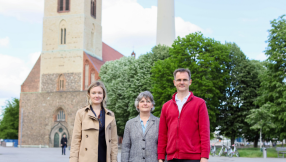Scottish and Bangladeshi churches team up on climate change
The simple system is made of a plastic water bottle with a hole in the bottom that allows water to drip onto crops.
Bangladesh is among the countries that have been worst affected by climate change, with a combination of droughts, floods and cyclones all afflicting the country in recent years. Rising sea levels pose further risks, as about half of the country lies 6m below sea level.
The two Churches have been working together on climate change for some years. The Church of Scotland was first stirred to help Bangladesh after hearing a moving plea from Bishop Michael Baroi at its General Assembly in 2006.
The address led to the creation of the Church of Scotland’s Responding to Climate Change project in 2007, which helps people in Bangladesh and other countries where the effects of climate change are already being felt.
The Church of Scotland is asking its congregations to help affected communities by making the changes to their lifestyles that can help reduce their carbon imprint.
Adrian Shaw, Climate Officer for the Church of Scotland in Edinburgh, said: “Domestically we are asking congregations in Scotland to turn their faith into action by reducing their greenhouse gas emissions to help others.
“This is a small first step but collectively we believe we are showing a way forward.”
An update on the situation in Bangladesh by the Church of Scotland’s Church and Society Council states that “few places in the world will experience the range of effects and the severity of changes that will occur in Bangladesh”.
It anticipates that in the coming years, the country will be hit by more extreme hot and cold spells, heavy monsoon seasons combined with inadequate rainfall at other times of the year, a rise in average temperatures, more tornadoes and cyclones and the displacement of communities as a result of rising sea levels.













